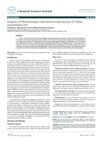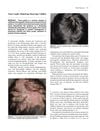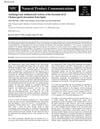 59 citations,
February 2021 in “Advanced Functional Materials”
59 citations,
February 2021 in “Advanced Functional Materials” The silk fibroin-based hydrogel shows promise for treating melanoma and healing infected wounds by killing tumor cells and bacteria, and supporting skin recovery.
 11 citations,
January 1998 in “Dermatology”
11 citations,
January 1998 in “Dermatology” Isotretinoin effectively treated severe acne in HIV-positive women, with improved skin and CD4 counts, but some experienced side effects like skin dryness and hair loss.
 7 citations,
April 2014 in “Facial Plastic Surgery Clinics of North America”
7 citations,
April 2014 in “Facial Plastic Surgery Clinics of North America” Neck lift surgery can lead to complications like hematoma, nerve injury, and skin issues, with various treatments available for each.
 3 citations,
January 2016 in “Chemical sciences journal”
3 citations,
January 2016 in “Chemical sciences journal” Tridax procumbens plant extracts, especially from ethanol, have strong antibacterial effects and contain beneficial compounds like flavonoids and tannins.
 2 citations,
August 2017 in “British Journal of Dermatology”
2 citations,
August 2017 in “British Journal of Dermatology” Hair loss in Cronkhite-Canada syndrome may be due to an autoimmune response.
 April 2017 in “The journal of investigative dermatology/Journal of investigative dermatology”
April 2017 in “The journal of investigative dermatology/Journal of investigative dermatology” Stress in hair follicle cells increases certain immune-related proteins, which might contribute to hair loss conditions.
 130 citations,
January 2017 in “International journal of nanomedicine”
130 citations,
January 2017 in “International journal of nanomedicine” Silver nanoparticles coated with substances like PEG showed strong antibacterial effects and improved wound healing when used in hydrogels.
 93 citations,
November 2018 in “Carbohydrate Polymers”
93 citations,
November 2018 in “Carbohydrate Polymers” New nanocomposites with copper show promise for healing burn wounds and regenerating skin.
 68 citations,
February 2015 in “Journal of the European Academy of Dermatology and Venereology”
68 citations,
February 2015 in “Journal of the European Academy of Dermatology and Venereology” Early onset and pustules indicate severe hair follicle inflammation, and while antibiotics help, the condition often worsens after treatment stops.
 67 citations,
February 1983 in “The Journal of Dermatologic Surgery and Oncology”
67 citations,
February 1983 in “The Journal of Dermatologic Surgery and Oncology” Vigilon, a new wound dressing, promotes faster and better healing with less pain.
 59 citations,
September 2007 in “Biochemical and Biophysical Research Communications”
59 citations,
September 2007 in “Biochemical and Biophysical Research Communications” The TRPV3 gene mutation affects hair growth by keeping mice in the growth phase longer, which could help treat hair loss.
 47 citations,
March 2022 in “Frontiers in cellular and infection microbiology”
47 citations,
March 2022 in “Frontiers in cellular and infection microbiology” Changes in skin microbes play a role in some skin diseases and could lead to new treatments.
 47 citations,
February 2019 in “Journal of The American Academy of Dermatology”
47 citations,
February 2019 in “Journal of The American Academy of Dermatology” LGBT individuals have unique skin health needs, including higher STD risks and side effects from gender-affirming treatments, requiring dermatologists to offer knowledgeable and culturally competent care.
 41 citations,
June 2018 in “Journal of The American Academy of Dermatology”
41 citations,
June 2018 in “Journal of The American Academy of Dermatology” Some treatments for folliculitis decalvans work well, with tetracyclines and a mix of rifampicin and clindamycin being most effective.
 40 citations,
August 2014 in “Journal of Nanoparticle Research”
40 citations,
August 2014 in “Journal of Nanoparticle Research” Silver nanoparticles in gel form can effectively heal wounds.
 37 citations,
January 2013 in “Postepy Dermatologii I Alergologii”
37 citations,
January 2013 in “Postepy Dermatologii I Alergologii” Isotretinoin effectively reduces acne but causes dry skin, higher skin pH, more redness, and hair loss.
 37 citations,
May 1999 in “Australasian Journal of Dermatology”
37 citations,
May 1999 in “Australasian Journal of Dermatology” Early diagnosis and treatment are crucial for preventing permanent hair loss in various scalp conditions, and while new treatments are promising, more research is needed to evaluate their effectiveness.
 35 citations,
May 2008 in “Journal of Clinical Oncology”
35 citations,
May 2008 in “Journal of Clinical Oncology” A cancer patient died from a severe skin reaction after taking the drug cetuximab.
 29 citations,
January 2007 in “Dermatologic Clinics”
29 citations,
January 2007 in “Dermatologic Clinics” Photodynamic Therapy is an effective treatment for mild to severe acne.
 23 citations,
August 2012 in “Veterinary dermatology”
23 citations,
August 2012 in “Veterinary dermatology” Skin infections in cats are more common than thought, often affect young cats with allergies, and need better treatments.
 22 citations,
September 2019 in “ACS omega”
22 citations,
September 2019 in “ACS omega” The new nanocomposite films are stronger, protect against UV, speed up wound healing, and are antibacterial without being toxic.
 19 citations,
February 2015 in “Contact dermatitis”
19 citations,
February 2015 in “Contact dermatitis” Avoiding certain fragrances improved the man's skin condition.
 14 citations,
August 2006 in “Clinical and Experimental Dermatology”
14 citations,
August 2006 in “Clinical and Experimental Dermatology” A girl with no hair neglect developed plica neuropathica in the hospital, lost all her hair, but it grew back.
 11 citations,
December 2014 in “The American journal of pathology”
11 citations,
December 2014 in “The American journal of pathology” A gene deletion in mice causes weak protein, immune issues, hair loss, airway problems, and wasting disease.
 10 citations,
August 2016 in “Oxford Medical Case Reports”
10 citations,
August 2016 in “Oxford Medical Case Reports” Tocilizumab therapy may cause skin and hair conditions like halo naevi, vitiligo, and alopecia areata.
 9 citations,
October 2013 in “Pediatric dermatology”
9 citations,
October 2013 in “Pediatric dermatology” Proper antifungal treatment is crucial to avoid misdiagnosis and prevent scarring alopecia.
 9 citations,
October 2012 in “Natural Product Communications”
9 citations,
October 2012 in “Natural Product Communications” The essential oil from Chamaecyparis lawsoniana has strong antibacterial and antifungal effects, especially against yeast and Gram-positive bacteria.
 8 citations,
June 1979 in “JAMA”
8 citations,
June 1979 in “JAMA” Synthetic hair implants can cause severe infections and are risky.
 7 citations,
March 2012 in “Journal of Investigative Dermatology”
7 citations,
March 2012 in “Journal of Investigative Dermatology” Some thymic peptides can increase human hair growth, while others may inhibit it.
 6 citations,
March 2014 in “Annals of Pharmacotherapy”
6 citations,
March 2014 in “Annals of Pharmacotherapy” A woman's hair loss was probably caused by the antifungal drug anidulafungin.





























